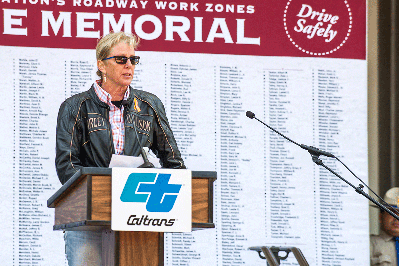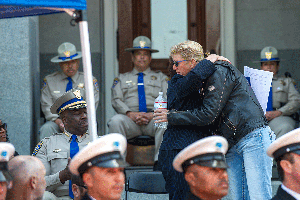Maintenance Manager II Deborah Prochnow spoke about the dangers highway workers face every day at the 2018 Statewide Caltrans Workers Memorial ceremony. Photo by Headquarters 
Each year, the family, friends, coworkers, bosses, and public come together at the Statewide Workers Memorial ceremony at the State Capitol to remember the Caltrans employees who have lost their lives while building, maintaining, and operating California’s transportation system—and to remember how to avoid any more deaths.
This hits close to home for many Caltrans employees, including Los Angeles District 7 Maintenance Manager II Deborah Prochnow, who offered her perspective of what it's like to work on the highways by reading her poem, “The Vest” at this year's memorial.
While driving to work this morning, I saw that the changeable message sign (CMS) was still on. Last week the CMS were all turned on because one of our neighboring districts lost another Caltrans worker: someone who I had never met but someone who was very much like me. He was the third person in less than two months we lost, who is just like I am. We have the same work schedule, we do the same job, (an insane and dangerous job). When we were kids, who knew that when we grew up we would be standing in the road shoveling stuff in a hole with cars whizzing by at 70 mph -- and not just cars, but semi-trucks too? A car weighs about 1,500 pounds moving at 80-feet-per second. Now that is some kind of weapon.
How about picking up litter on the side of the road? Your timing must be just right. You have to open the door exactly when there is enough space between two cars for you to get out of the truck and get to the front of it without getting struck. That is only half the battle. Then you have to get back in your truck. This is your job for the day: Getting in and out of your truck a few hundred times or so, filling up your truck with debris from the side of the road. Why do we do it? We do it to give the public and California Highway Patrol (CHP) a safe place to pull over.
Maybe it would not be so bad if the drivers would just slow down and move over. But you know damn well they don't see you. Everyone said it to you when you were young, "Make sure you look both ways before you step off the curb." Then came cell phones. People now have a rolling weapon in one hand and a cell phone in the other. Trying to make eye contact with these people is impossible. Then came texting. Isn't that great?! Now they have a phone in one hand and are typing with the other, their eyes anywhere but on the road. Who is aiming the weapon?
We now work in a job where people have rolling weapons and are firing them blindly at everyone they pass. Who will they hit? We know they can’t see us! When I first started, all we had to worry about was drunk drivers. CHP and the fire department call for us in the middle of the night to protect them from distracted motorists, but when they see police they slow down. They take their foot of the gas, slow down and check their speed.
What would that feel like if they did that for me?
Calls in the middle of the night are never good. You’re not really all there, still half asleep but, it is your responsibility to take care of your section of road. You have people to protect. You never get used to it! Flying out of bed to get to the phone before the second ring so no one else in the house will wake up. Holding your breath so you can listen to see if everyone is still sleeping. You’re so thankful when you hear that everyone is still sleeping (you know that will be the best part of the night). You go to the dirty clothes bin to get the clothes you wore yesterday -- because the fact is, you’re going to get dirty.

After Maintenance Manager II Deborah Prochnow spoke at the 2018 Statewide Caltrans Workers Memorial ceremony, she hugged Director Laurie Berman, who has also worked on the highways, and knows the dangers employees face.
Photo by Headquarters
There are things you see, but never talk about. Usually a drunk driver has killed again with his rolling weapon, violently taking the life of another person. A jumper jumps off a bridge and has been torn into pieces, or the constant recurring horrific wrecks of twisted metal where the driver or passenger is covered with a yellow plastic sheet. Soon the family will have a knock on the door, only to find out that they will never see or feel the love of their family member again. And for just a few seconds you allow yourself to feel their pain but no longer than that. You know the destruction that a vehicle can inflict. You have to snap out of it, push it down deep so you can’t feel it, focus on staying alive and put your guard up. You know everything must be cleaned up before the morning rush hour and the clock is ticking. You start calling out crew members one by one by one hoping they will answer their phone.
Nothing could prepare you for the things you see. How many seconds does it really take for a collision to happen? How many seconds were their eyes off the road? Every once in a while, people do see you, and they move over. Every once in a while, they slow down, but most of the time you are invisible to them. One mistake and you are dead. Then there are those close calls no one really wants to talk about. Like the time when you open the door and the vacuum from the truck that just went by pulls the door open. You grab it with your other hand because if you don't, you would be sucked out too. Or when your vehicle is parked on the shoulder and your light is on because there is a chunk of metal in the road and you are parked behind it. People are dodging the pieces of metal but won’t slow down. Cars are cutting off each other and hitting the pieces of metal and you almost get hit by a car swerving. What is a matter with them? Why won’t they slow down when they see my light? I am trying to protect them.
How many times have you seen your life pass in front of you? There's a flash of light that takes a millisecond and you see your entire life. When it is over and you regain composure, what you see is your loved ones and what pain they would feel if you were gone. Then, the end of the day comes and you go home, look into the eyes of your loved ones and hold them close – knowing how dangerous today was. When they ask if you’re ok because they can feel something is different, you just say you're fine. You can’t say anything because you don’t want them to worry any more than they already do. Tomorrow you will go to work as if nothing happened. You will stuff the brush with death way down deep. You will get your instructions for the day, put on your vest and hard hat and get back to work.
You are the unsung hero, protecting people who don’t see you.

